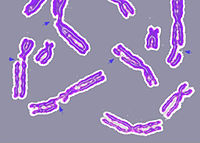
Photo from wikipedia
DNA mismatch repair (MMR) is an essential physiological process for correcting mutations occurring during DNA replication. Deficient MMR (dMMR) leads to increased tumour mutational burden, with a heightened risk of… Click to show full abstract
DNA mismatch repair (MMR) is an essential physiological process for correcting mutations occurring during DNA replication. Deficient MMR (dMMR) leads to increased tumour mutational burden, with a heightened risk of neoplasia. Demonstration of dMMR via the immunohistochemical assessment of MMR proteins is useful when screening for inherited cancer syndromes (especially Lynch syndrome) and for the prediction of clinical cancer response to conventional chemotherapy and novel immunotherapies. Identification of dMMR may also be helpful in other situations e.g. when considering a diagnosis of conventional dysplasia in sessile serrated lesions of the large intestine. This article provides a practical illustrated guide to DNA MMR interpretation, using a series of clinical examples.
Journal Title: Histopathology
Year Published: 2021
Link to full text (if available)
Share on Social Media: Sign Up to like & get
recommendations!